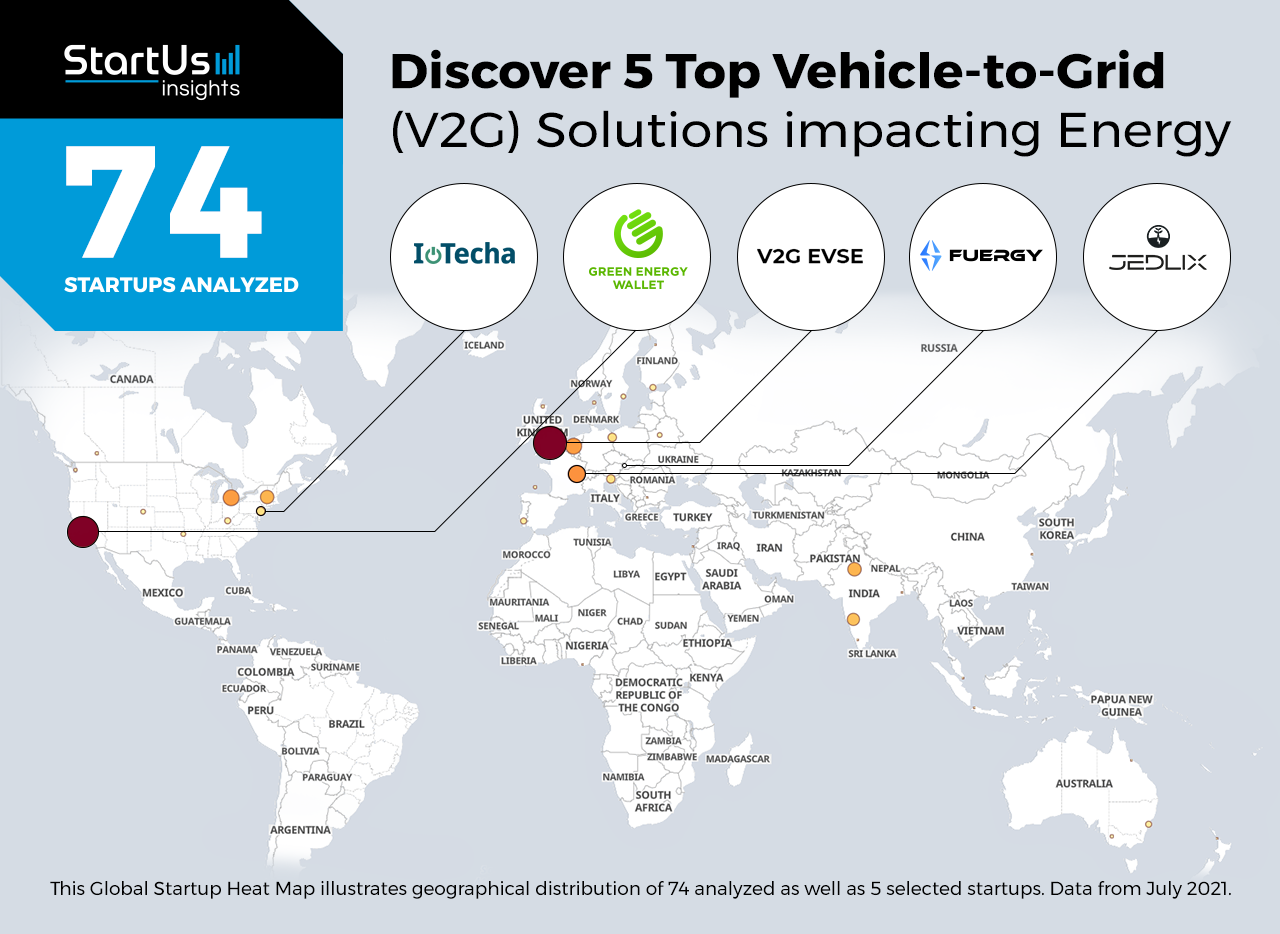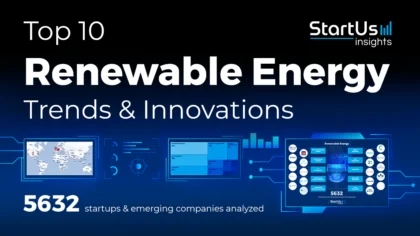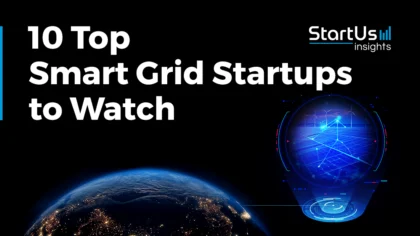Staying ahead of the technology curve means strengthening your competitive advantage. That is why we give you data-driven innovation insights into the energy industry. This time, you get to discover 5 hand-picked startups developing Vehicle-to-Grid solutions.
Global Startup Heat Map highlights 5 Top Startups developing Vehicle-to-Grid Solutions out of 74
The insights of this data-driven analysis are derived from the Big Data & Artificial Intelligence-powered StartUs Insights Discovery Platform, covering 2.093.000+ startups & scaleups globally. The platform gives you an exhaustive overview of emerging technologies & relevant startups within a specific field in just a few clicks.
The Global Startup Heat Map below reveals the distribution of the 74 exemplary startups & scaleups we analyzed for this research. Further, it highlights 5 energy startups that we hand-picked based on criteria such as founding year, location, funding raised, and more. You get to explore the solutions of these 5 startups & scaleups in this report. For insights on the other 69 Vehicle-to-Grid solutions, get in touch.
Jedlix offers a Vehicle-to-Grid Platform for Smart Charging
The electrification of the mobility sector creates a huge demand for electrical energy. Unlike most of the other participants on the grid that directly consume energy, vehicles use the power from the grid for charging batteries. In most cases, they do not utilize all of the stored energy, especially in the case of daily commuters. All this leftover energy can easily support the grid in peak demand hours. Therefore, energy startups and scaleups are developing smart charging solutions to return unused energy to the grid.
Jedlix is a French startup that develops and operates a Vehicle-to-Grid energy transfer platform. The startup’s solution optimizes the charging and discharging of electric vehicles, as well as facilitates their insertion into the power grid at scale. The solution enables users to monetize their charging process, reducing the total cost of ownership of the vehicle and optimizing the use of renewable energy. Additionally, Jedlix also offers a mobile application that provides information including usage, battery status, and savings made. Together with energy companies, the startup also creates an energy storage solution and accelerates the energy transition of the mobility sector without additional capital expenditures (CAPEX).
IoTecha provides an IoT-based Cloud Platform for Vehicle Grid Integration
Vehicle-to-Grid energy transfers transform vehicles into storage assets for grids. The efficient utilization of these assets is possible only with the proper exchange of information between the grid and the vehicle. This is why energy startups are developing Internet of Things (IoT) devices and software platforms that collect the required data and process them to facilitate a seamless energy transfer. Further, these solutions allow charge point operators (CPOs) to monitor charging status and optimize performance.
IoTecha is a US-based startup that provides hardware and software components for smart charging infrastructure. IoT.ON is the startup’s cloud-based software that analyzes the operational data, collected by the combined charging system on module (CCSoM) devices. The software then provides intuitive visualizations and operational insights to the CPOs. IoT.ON Edge is the on-premises smart charging manager that offers Electric Vehicles (EVs) demand-aware load sharing and load optimization using the available and forecasted load curve information. This allows car batteries to balance the variations in energy production and consumption at the same time taking advantage of electricity price fluctuations.
Green Energy Wallet uses Blockchain for Vehicle-to-Grid Transactions
Charging a vehicle charging generates data that captures a wide variety of information including the amount of energy charged, duration of charge, location, trouble codes in case of equipment failure, and much more. All this information is critical for utility companies to charge their customers and for consumers to claim rewards for discharging to the grid. This is why startups are developing software solutions that use the blockchain to record Vehicle-to-Grid transactions. Blockchain technology offers a decentralized immutable digital ledger that makes the billing and reward process for EV charging much more transparent.
US-based startup Green Energy Wallet (GEW) develops a mobile application that provides a software connection between the electric vehicle, the charging station, and the power grid. The blockchain-based app supports the seamless transfer of energy from one person to another person or the utility company without relying on a mediator, thus significantly reducing fees. The application uses a tokenized system that rewards users with tokens named NRG for allowing the use of their car battery as a buffer store. These tokens are convertible to energy or other assets on the blockchain such as cryptocurrency. The profit on the token reward incentivizes the use of renewable energy, thus advancing the energy transition.
V2G EVSE develops a Bi-Directional Charging Station
The charging station is the most important component of a V2G system that makes it different from V1G systems that only allow unidirectional charging. A bidirectional charging system facilitates the two-way flow of energy that enables transmission as well as utility operators to purchase energy from customers during periods of peak demand. This creates a bottleneck around these charging stations for the implementation of a secure and reliable V2G system. To address this challenge, startups and scaleups are developing bi-directional charging stations.
V2G EVSE is a UK-based startup that deals with the development of bi-directional charging systems for vehicle-grid integration. The startup develops a bi-directional inverter and a V2G controller with a communication module integration. The startup’s design focuses on reliability that allows for minimal charger downtime and optimum performance round-the-clock. Currently under development, the communication module enables the V2G system to resist any cybersecurity attacks. All these performance and security criteria promise a resilient V2G system.
Fuergy provides an AI-powered V2G System
EV integration requires the processing of a large amount of data with the final results of this processing providing insightful information that allows the efficient utilization of V2G resources. This is why energy startups are developing Artificial Intelligence-powered V2G management systems. AI algorithms allow these solutions to quickly and accurately generate trends and forecasts for optimal charging.
Fuergy is a Slovakian startup that develops hardware and AI-powered support software to optimize energy consumption. brAIn is the startup’s multifunctional software that collects data from monitoring devices and provides insightful information using AI algorithms. Fuegy’s solution monitors the grid status and electricity production to suggest charging and discharging patterns. These patterns streamline battery life, performance, and efficiency, as well as create financial benefits for vehicle owners.
Discover more Energy Startups
Energy startups such as the examples highlighted in this report focus on Demand Side Management, Distributed Energy Resources, Quantum Computing as well as Energy Storage. While all of these technologies play a major role in advancing the energy industry, they only represent the tip of the iceberg. To explore more energy technologies, simply get in touch to let us look into your areas of interest. For a more general overview, you can download our free Energy Innovation Report to save your time and improve strategic decision-making.


![Dive into the Top 10 Energy Industry Trends and Innovations [2025]](https://www.startus-insights.com/wp-content/uploads/2025/03/Energy-Trend-SharedImg-StartUs-Insights-noresize-420x236.webp)






